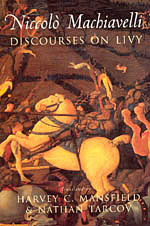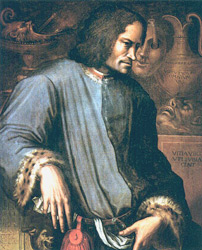|
|
|||||||
|
One can make this generalisation about men: they are ungrateful, fickle, liars and deceivers, they shun danger and are greedy for profit.[1]
History has attributed many faces to Niccolò Machiavelli, the Florentine civil servant and political thinker: worshipper of antiquity, defender of republican ideals, opportunistic policy maker propagating intrigues and hypocrisy, ruthlessness and treacherous machineries.[2] Shortly exploring Machiavelli’s teachings on power and politics, this article concentrates on The Prince, the book that earned the Renaissance political realist much of his controversial reputation. As a magistrate responsible for the conduct of foreign and military affairs, Machiavelli acquires broad knowledge of diplomacy, war and the problems of territorial administration in early sixteenth-century Italy. His earliest political writings, composed at a time the city-republic was confronted with several rebellions, focus on the security and recovery of Florentine territories, passionately criticize mercenary warfare and agitate for the organisation of a defensive civic militia. Only after the fall of the republic in 1512 does the socio-political structure of communities become a dominant subject of his thought.
Since my intention is to say something that will prove of practical use to the inquirer, I have thought it proper to represent things as they are in real truth, rather than as they are imagined. Many have dreamed up republics and principalities which have never in truth been known to exist; the gulf between how one should live and how one does live is so wide that a man who neglects what is actually done for what should be done learned the way to self-destruction rather than self-preservation.[3]
Machiavelli asks by what means a prince can establish and maintain his rule. Furthermore, he investigates the role of the pre-existing frame of government, as well as the meaning of virtue/s and fortune in this process. Starting from the premise that the desire to acquire greatness and glory is natural to man, he describes how a ruler is to do so, in his own principality and abroad. The famous chapters on the qualities required for a prince who wishes to preserve his power invert the moral
and religiousteachings of the medieval and humanist advice books for rulers[4] by proposing an alternative rationality and a new code of political conduct. Against the classical connection of politics to the establishment and preservation of a good, a peaceful community on the grounds of virtuous living, Machiavelli shapes a new understanding of politics through the pursuit of power and the willingness to exercise brute force. Machiavelli’s new explanation of princely virtue challenges the prevailing humanist assumptions. He separates personal from public virtues and vices, which help or hinder a prince in acting politically and thus in attaining fame, glory and honour. Many medieval and early humanist thinkers had called on virtuous Christian rulers to exhibit examples of personal morality and integrity. Machiavelli, by contrast, concentrates on the effects - good and bad - such qualities can have on government.
A wise prince ought to guard himself against vices if he can, but if he cannot, then he should continue to indulge in them without giving the matter another thought.[5]
A prince of true political virtue therefore is one, who turns necessity into a virtue.[6]
It is necessary for a prince who wants to maintain himself to learn how not to be good, and to use or not to use this knowledge according to necessity.[7]
For Machiavelli, the use of cruelty and deceit as possible and necessary means to achieve the desired ends is a consequence of the natural wickedness of men. In order to maintain and strengthen his power a prince, and particularly a new prince, must be free to act against loyalty, charity, humanity and religion, while at the same time keeping up the appearance to truly respect religion, humanity, charity and faith. Concealment, remoteness and dissimulation are therefore arts of first political importance. Machiavelli’s teachings on the flexibility of conduct are - even though highly pragmatic - affected by his understanding of the influence of fortune upon human and especially princely actions. He therefore stresses on the interaction of fortuna and virtù, the umbrella-term for several qualities like energy, straightforwardness or courage displayed in reason of political necessity, which enables man to achieve power and greatness in spite of the changes of fortune. The ever-changing variations of good and evil manners can only be understood, if the ruler as a human being acts freely by re-acting, under circumstances dictated, not by himself.
Lorenzo de Medici
Further Reading: Machiavelli, Niccolò. The Prince. Translated by George Bull. Harmondsworth1961. Mansfield, Harvey C. Machiavelli’s Virtue. Chicago 1998. Viroli, Maurizio. Machiavelli. Oxford 1998.
[1] Prince, p. 96. [2] Niccolò Machiavelli (1469-1527) entered the business of Renaissance politics as a Secretary of the Florentine republic. His duties included several diplomatic missions to Italian city-republics and principalities, to France and Germany. In 1512 the republic collapsed after the defeat of its French allies by Spanish forces. The Medici family returned to power. Machiavelli was removed from office and imprisoned for participating in an alleged conspiracy. After his release, Machiavelli worked on two books, which would become classics of political thought: Il Principe (The Prince), dedicated to Lorenzo de Medici and the Discorsi sopra la prima deca di Tito Livio (Discourses on Livy). In 1552 the Catholic Church published its first Index of prohibited writings, which largely contributed to the legend of the „murderous“ Machiavelli, all of his works having appeared on this black list. [3] Prince XV. [4] the so called “mirrors of princes”. [5] Prince XV. [6] The necessity being the maintenance of his state and the achievement of great things. [7] Prince XV.
Sources of pictures: www.fdungan.com/ prince.htm, http://www.virtusens.de/niccolo_machiavelli, http://www.press.uchicago.edu/cgi-bin/hfs.cgi/00/13040.ctl
|
|||||||
|
|
|||||||



